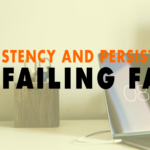Consistency and Persistence vs Failing Fast
- Recognizing that somethings failing01:18
- Consistency and Persistence 04:27
- Marketing is a series of tests and experiments 07:16
Read the full episode transcript below:
00:25 David Blackmon: Hey everybody, Welcome to another episode of WP The Podcast brought to you by WP Gears. I’m David Blackmon.
00:35 Tim Strifler: And I’m Tim Strifler.
00:37 David Blackmon: Today we’re going to talk about consistency and persistence versus failing fast and it may be a little bit confusing, it may not. Tim’s going to give us kind of a little intro as to what we mean by the title of this topic and then we’re going to talk about It.
01:18 Tim Strifler: Yeah and uh this is really sort of a continuation of the topic that we did yesterday episode 637. So definitely uh listen to that um after this if you haven’t already or you can pause this episode and listen to yesterday’s first. Yesterday we talked about the tale of the tortoise and the hare and how it relates to business and really kind of the the lesson being consistency and persistence pays off and effort that you put in. Today you might not see the full benefit but later down the road you will by sticking with it and and being consistent no matter what business
you’re in whether you’re in client services and you’re you know making connections and and you know getting referrals and stuff or you’re you know doing content marketing the consistent. The value of doing consistency there um but there’s a whole other kind of uh businessy term called failing fast and and this is something I learned, I think originally in school taking entrepreneurship courses. And the the concept of failing fast and this is really really important in like the startup world and in you know new businesses where you’re iterating and you’re pivoting and stuff. And you have to recognize when something isn’t working and you fail fast meaning you move on to something else. And you pivot and you iterate and you know and so forth and so. Those can sometimes seem like conflicting values right consistency and persistence and then failing fast because it’s like, okay well you just said be consistent and stick with it and be persistent, even if you’re not seeing the results right away. But then how do you fail fast which is basically you know changing it up and and you know recognizing that something’s failing. And so how do you recognize when to do what when to fail fast and when to be consistent and persistent and so that’s kind of what we wanted to talk about today. And this is one of those topics where there’s not an exact right answer or an exact wrong answer and so forth and so you know, sometimes it requires kind of going with your gut and or getting outside counsel mentoring coaching that sort of thing. And I’m gonna start off because David was like, I don’t know what the right answer is, I was like either do I, but i’m going to kind of just.. kind of think out loud here and say that first of all there’s as I mentioned there is an exact right answer. But I think if you are following things that are known, to be best practice then it is worth sticking with it. So for example if you know that like in your client service business that it’s all about relationships and something that David
and I preach all the time is it’s all about people wanting to hire, people that they know, and trust or someone that they know and trust knows and trusts right referrals right? And so if you know that principle then you can go out and make connections with business owners and you’ll know that eventually that’s going to pay off. Because you’re establishing yourself as an expert in the community. Aand so forth and you know chances are, if you keep doing that it’s going to work. Because that’s best practice with failing fast it’s more on the other hand side of things when you’re doing something that maybe hasn’t been done before. A new business model you know or a new type of product or something and it’s uh you know you’re you’re out there and you’re not sure if it works yet and so you kind of need to wait and see. And then if it doesn’t work okay you can pivot and so that’s kind of the distinguish. How I distinguish it in my head between the two it’s not an exact formula by any means but um if you’re following best practices for for doing something chances are if you stick with it it’s going to work. Would you agree David?
04:27 David Blackmon: Tim you just stole my thunder brother! You just stole my thunder! I was thinking the exact same thing Tim, and i didn’t we don’t really talk about pre-podcast stuff what we’re gonna say. We kind of dive into it we let our own experiences kind of share our own experience so we’re not biased and stuff and we feel like that tandem that dual you know.. perspective tends to be really good for valuable for
our listeners. But this is one time where we could have talked about this ahead of time because I couldn’t agree more with what he said. The whole time I was thinking about consistency and persistence in that realm uh was the comment that he mentioned. Like blogging for example
you know, and we know that search engines for example they content is king! So we know for sure 100 percent certain that if you produce valuable relevant content over an extended period of time search engines are going to begin to see you as an authority in that subject. Don’t know when it is typically will happen somewhere between 6 and 18 months. That’s typically our experience and so we know that that’s a tried and true thing that you can do for your business to get traffic about your specific topic. That’s one thing that you can do and I think when I think about failing fast, kind of what he was talking about I think a lot about mvpąs you know. A lot of businesses you know, especially startups and
stuff and where they use this phrase is they they do a minimum viable product which is an mvp so they want to see is there interest in it. You know they want to stick their toe in the water before diving full on their whole body into the deep. End to make sure that hey this is a viable thing people going to want to purchase this and when they do find out about that, then you can go with the consistency and Persistence of your track. So um you know question that Tim asked, and you know what’s the answer how do you know when you know.. I agree with him again. I think that you’ve just got to trust your gut. You got to kind of give you know your audience. Hopefully in your perspective arena you know your audience better than you know, your your business guy down the road, who may not know your business as well as you. And you’re just going to have to trust your gut your intuition and make a judgment and then if it doesn’t pan out over an extended period of time, and you’re not making money… Well guess what that’s going to force you to quit. You’re going to know “hey I got to stop I can’t Keep keep doing this”. So hope that hope I didn’t repeat what Tim said so yeah..
07:16 Tim Strifler: No no that was good and it actually made me think here you know. It’s not always one or the other and we kind of set this topic up because in some cases you know it is one or the other but they’re not mutually exclusive all the time. So for example you can be consistently and persistently trying different things right and then and then failing fast when those things aren’t working out. Right? So if you think about marketing being you know, they say marketing is you know a series of tests and experiments and trial and error and so forth. And so you know and then once something works you keep doing it and stuff and so if you think of that in your business, you know, of a way of getting new clients or getting new customers, acquiring customers. And whatnot you can be consistently and persistently trying new things and then if they fail, you fail fast and you don’t keep doing it if it’s not working. And you move on to something else where the big picture you’re being consistent and persistent and you’re you know you’re going to be The tortoise in the long run. But in the the short term you’re failing fast and so you can kind of do a combination of the two. So you can kind of look at it that way too and it’s not consistency and Persistence versus failing fast it’s and failing Fast so ..
08:28 David Blackmon: Boom!
08:28 Tim Strifler: Boom!
08:29 David Blackmon: Boom! We hope you’ve gotten a lot out of these last two topics guess what it’s not over with yet because tomorrow in episode 639 we’re going to talk about the rule of compounding effort and how it relates to web design. If you want to find out what compounding effort is you’re going to have to come tune in tomorrow and listen to tomorrow’s podcast episode. Tim until tomorrow we’ll see you then.
08:56 Tim Strifler: Take care bye-bye.

Did you Enjoy this Episode?
- Will you consider sharing it online? Just click one of the share buttons below!
- Will you leave us a review? 🙂
- Have a question, or a topic request? Let us know in the comments below!
Want to Connect with David & Tim?
- David:
- Tim:








